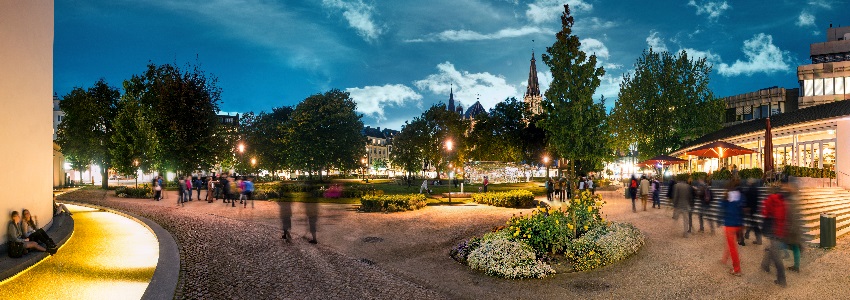Declaration by the Board of Directors of the Society for the Conferring of the International Charlemagne Prize of Aachen to the Hungarian Writer and Sociologist György Konrád
 Reflections on the role of culture in the development of the European Union often include reference to Jean Monnet (Charlemagne Prize laureate of 1953), who when well advanced in years said: "If I were to start all over again, I would begin with culture." And indeed, with the completion of the Single European Market, Europe's economic and political integration has progressed far; and the agenda today additionally includes enlargement embracing the new democracies of central and eastern Europe, as well as the deepening of the Union and its structural integration.
Reflections on the role of culture in the development of the European Union often include reference to Jean Monnet (Charlemagne Prize laureate of 1953), who when well advanced in years said: "If I were to start all over again, I would begin with culture." And indeed, with the completion of the Single European Market, Europe's economic and political integration has progressed far; and the agenda today additionally includes enlargement embracing the new democracies of central and eastern Europe, as well as the deepening of the Union and its structural integration.
But Europe's "human integration" is underdeveloped in both perception and practice. For the "Common European House", special importance attaches here to culture as the most pragmatic level of encounter and exchange. Europe is a politico-cultural whole, united by the common heritage of Christianity but also by that of the special European impetus provided by the monotheistic religions of Judaism and Islam, the Renaissance and the Enlightenment, as well as the great philosophical and social teachings of the 19th and 20th centuries. In this cultural heritage lies enormous potential for a policy of peace, understanding, and good-neighbour relations. Culture is also a means of practising democracy, whose roots we have in Europe. It creates human ties and generates tolerance for other cultures and other people.
The vision of One Europe was and is the hope and goal and perspective deriving from shared values and a sense of European responsibility, and extending far beyond day-to-day politics. Accordingly it is stated in the 1949 Proclamation of the International Charlemagne Prize: "Since human progress has always been initiated by individual personalities of genius who despite all opposition totally dedicated themselves to their idea," it behoves us to point to these personalities "as examples, and to urge emulation and realization of their ideas". Our European identity has its very roots in the diversity of national and regional cultures. And to ensure that this diversity enriches us rather than engendering controversy, we require better mutual knowledge of our neighbours' history, traditions, language, and customs. In taking notice of and understanding the others, we learn something about our own identity. Europe will grow together in direct proportion to the growth in awareness of this cultural unity, a unity in diversity.
A personality of European culture who stands out in this respect, who invariably makes freedom and responsibility a focal point of his reflections, who in taking a stand goes beyond his own literary, journalistic and scholarly field and, in the tradition of the European Enlightenment, "intervenes" in the best sense of the word - such a personality is the Hungarian writer and sociologist György Konrád. This homme des lettres is not only an excellent representative of Hungarian culture; the themes and subject matter of his literary work are permeated with the awareness of supranational European culture and history.
Born in 1933, the son of a Jewish ironmonger in Debrecen near the Romanian border, Konrád lost a large part of his Jewish family during the National Socialist persecution of the Jews and survived by fleeing to relatives in Budapest.
György Konrád is a political writer sui generis: writing for him is a form of social intervention. The telos of his political essays and of his novels is freedom and human dignity. Thus Konrád emphatically welcomed the upsurge of democracy in central and eastern Europe. In 1969 he published his first novel, "Der Besucher" (The Case Worker), which made him internationally known overnight. The impetus of his social criticism led to constant observation by the Communist Party of Hungary. In 1974, on the anniversary of the 1956 Hungarian revolution, he was arrested because of his critical essays. Offered the option of leaving the country, he rejected it and became a "pseudo-psychologist" in a mental institution.
The sociological study on "Die Intelligenz auf dem Weg zur Klassenmacht" (The Intellectuals on the Road Toward Class Power), appearing in 1978, is the first of the major essays. The role of the dissident; reconstruction and the proclaimed credo of the civil society; the vision of Central Europe over against the world of Yalta. A life lived in limbo between growing fame in the west and the publication ban in Hungary, between awards and study grants, samizdat and manuscript-smuggling.
In particular György Konrád pleaded in this period for a gradual and treaty-based liberation of eastern Europe in the framework of a free and independent Europe. This got him the icy rejection of fellow-writers in the East Bloc and sharp criticism from Budapest. There was a further exacerbation when Konrád publicly supported the "Solidarnosc" trade union movement in Poland and when in 1984 he was given the Herder Prize including a large cash award. In 1985 attention refocused on Konrád the writer with the appearance of the collection of political-moral essays entitled "Antipolitik. Mitteleuropäische Meditationen" (Antipolitics):
Antipolitics is the moral assessment of politics. Morals themselves cannot replace politics, but in the Socratic sense they can be the daemon of politics, their nightmare, their guilty conscience; they can be the dreaming activity of politics.
This book made no small contribution to democratic renewal in Hungary at the end of the eighties. In the turn to democracy in central and eastern Europe Konrád saw confirmation of his belief that the "dangerous and primitive condition of the bipolar global model" could be overcome only from the centre. Thereafter Konrád assigned priority to the problems resulting from the growing nationalism and economic imbalance prevailing in Europe.
In his view, the great task facing Europe today is the renewal of the awareness of its cultural common ground and roots. This Europe has a firm foundation on which we can build. And this common ground does not preclude particularities - for example, national distinctions - quite the contrary. The One Europe must not only tolerate but expressly desire diversity. East and West Europeans cannot but learn from one another in the interest of Europe: At last it is possible in mutual exchange to address history, cultural traditions, literature, music, cinema - without censorship and without the tutelary control of the powers that be.
In May 1990 György Konrád was elected president of the International PEN Club, an office he held up to 1993. He was awarded the Peace Prize of the German book trade in October 1991 in Frankfurt. The Foundation Board thus paid tribute to Konrád's thinking and writing, which from the outset was focused "on overcoming the division of Europe resulting from the Second World War".
He has become for many a moral authority, an extraordinary person whose warmhearted, sympathetic personality and humanity spontaneously communicate themselves. Literature is for him a medium of bringing peoples and civilizations closer to one another. As a European humanist, cosmopolitan and bridge-builder, György Konrád has been actively involved in the cause of justice and reconciliation and thus of Europe's growing together.
His idea of the humane society and the pursuit of political and moral values combine into an all-encompassing tolerance of all ways of and attitudes to life. Love, fellow-feeling and solidarity are values he forcefully incorporates. He thus represents in the best sense of the word the values that Europe associates with the age of Enlightenment.
Peace is a central condition for keeping the earth habitable. For György Konrád peace is not a value per se; it means unceasing activity, an unflagging and undespairing endeavour. Peace is more than the absence of war. Peace prevails when mind can engage mind free of physical or psychic restraints, when the means of contention are the pros and cons of argument rather than censorship and truncheons. "Peace is mightier than war; for most of daily life is on the side of peace," says György Konrád. He has fought against resentment and ill-will and pleaded for tolerance. He has contributed to further developing friendly relations among nations and peoples and to curbing the spirit of suspicion and fear and bias.
Europe is inter alia an intellectual process, centring not on contentment with the status quo but on the hope and incipient awareness of a better future. Many dreams have the name of Europe written on them. Here is how György Konrád phrases it:
We are Europeans by virtue of a complex interior activity of the brain, the flexible coping with our inner paradoxes, the pleasure we get from multiformity, the conversion of the diversity of our roles into creative tension; we are Europeans in our appreciating or intellectually sympathizing with different cultures, and in our confidence of not losing ourselves in so doing.
Since May 1997 György Konrád has been President of the Berlin-Brandenburg Akademie der Künste (Academy of Arts). Major publications include the following (published English translations in brackets): "Der Besucher", 1973 (The Case Worker); "Der Stadtgründer", 1975 (The City Builder); "Die Intelligenz auf dem Weg zur Klassenmacht", 1978 (The Intellectuals on the Road Toward Class Power); "Der Komplize", 1980 (The Loser); "Antipolitik. Mitteleuropäische Meditationen", 1985 (Antipolitics); "Geisterfest", 1986 (Feast in the Garden); "Stimmungsbericht", 1988; "Melinda und Dragoman", 1991; "Melancholie der Wiedergeburt", 1993 (The Melancholy of Rebirth); "Heimkehr", 1995; "Identität und Hysterie", 1994; "Steinuhr", 1995 (Stonedial); "Vor den Toren des Reichs", 1997.
György Konrád lives with his wife Judit Lakner in Budapest; they have two sons and one daughter.
The Board of Directors of the Society for the Conferring of the International Charlemagne Prize of Aachen honours in the person of György Konrád a European writer and essayist of world rank, who during his lifetime has been actively engaged in lighting the way to the goal of Europe's growing together and of establishing open societies, championing these causes in his prose and in the politico-cultural arena, undaunted by personal hardship and imprisonment.
The conferring of the International Charlemagne Prize of Aachen in 2001 on György Konrád is also intended to underscore the immense importance and achievement of writers, men and women, serving the cause of the "Common European House", particularly against the background of a media-created global interlocking in which the pace is often faster but the thinking no deeper. His life and his work form a great harmonious whole, reaching in impact beyond the boundaries dividing states and peoples, ideologies and creeds. Animated by a spirit of international understanding and preserving peace, his writing has helped to foster appreciation for the particular terms and conditions applying to the "other" partner. György Konrád is almost uniquely suited among intellectuals to bring home to the people in Europe, east and west, the challenges and tasks growing out of the common values that are given notable expression in the recently agreed Charter of Fundamental Rights.




